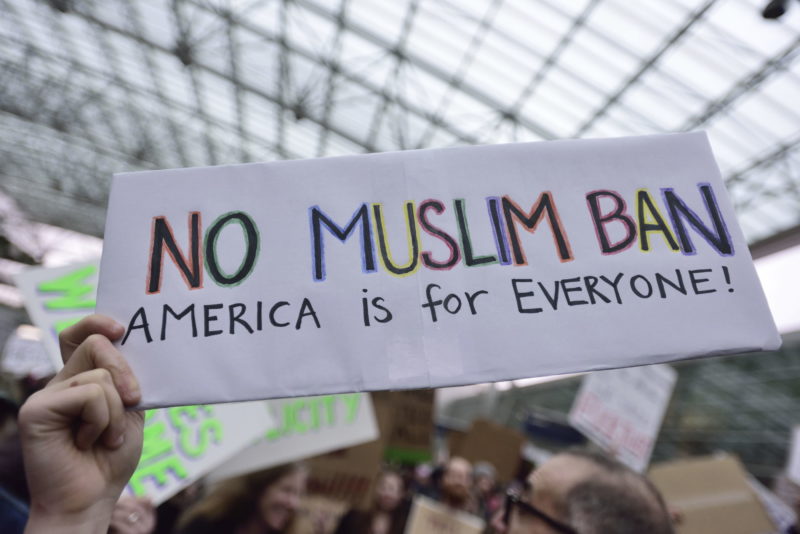 An MIT engineering student who went home for winter break. An Iranian Ph.D. coming to Boston to work on a tuberculosis project at Harvard Medical School, and an Iranian scientist tackling cardiovascular disease in a university lab.
An MIT engineering student who went home for winter break. An Iranian Ph.D. coming to Boston to work on a tuberculosis project at Harvard Medical School, and an Iranian scientist tackling cardiovascular disease in a university lab.
These are among the U.S. faculty, students, and academic researchers who have been stopped at the borders by President Donald Trump’s executive order banning Muslims and refugees from seven countries, an act that NEA President Lily Eskelsen García this weekend condemned as “a deliberate and coordinated attack on our core values as Americans and on those who come to our country seeking safety, freedom, and opportunity and, in the process, make America a better country.”
Trump’s order has specific implications for colleges and universities in the U.S., where more than 17,000 higher-education students come from the seven countries, according to Inside Higher Ed. This number includes graduate students like Stony Brook University’s Vahideh Rasekhi, who was detained this weekend at New York’s JFK Airport after flying home to Iran to renew her student visa.
“These are people who positively contribute to society. They don’t do anything wrong. Whether they’re doing cancer research, or working on new technologies or how to improve the education system, they’re helping to make America great! They’re not doing anything negative towards this country,” said Samantha Hernandez, director of legislative affairs at the National Association of Graduate-Professional Students (NAGPS.)
Tens of thousands of protesters have condemned Trump’s actions, as have business and Christian leaders, and more than 7,000 U.S. faculty, including 40 Nobel Laureates and NEA Higher Ed leaders such as California Faculty Association President Jennifer Eagan and United Faculty of Florida President Jennifer Proffit. All of those academics have signed a condemnatory statement that calls the ban “discriminatory” and “detrimental to the national interests of the United States.”
On Tuesday, February 1, a #DontBanMe campaign launched by the graduate student association asks students, educators, and their supporters to call Congress and ask them to take a stand against the executive order. (For more information on how to participate, find NAGPS on Twitter or Facebook.)
“We don’t teach hate…Period.”
Trump’s order, which was issued late Friday, suspends the entry of all refugees for 120 days, bars Syrian refugees indefinitely, and prevents citizens of Iran, Iraq, Libya, Somalia, Sudan, Syria and Yemen from entering the U.S. for 90 days. By Saturday, travelers around the world had been stranded, defiant protesters were packing airport lobbies, and a federal judge had heard an emergency appeal from the American Civil Liberties Union and granted a temporary stay that temporarily blocked the deportations of refugees and others trapped in American airports.
Among the detainees on Saturday, who eventually were released, were two University of Massachusetts Dartmouth engineering professors. Originally from Iran, both earned PhDs from American universities and both have been legal, permanent residents of the U.S. for more than a decade. “I never felt that we were going to be banned from entering the country,” Mazdak Pourabdollah Tootkaboni told The Boston Globe.
Educators oppose these ill-conceived, hateful actions because they are a drastic departure from our core American values. We don’t teach hate, we do not tell people how to pray, and we do not ban people based on their religion. Period” - NEA President Lily Eskelsen García
But the judge’s temporary stay on Saturday only affected those in transit—it does nothing for students and other academics caught in their home countries. They include Iranian scientist Seyed Soheil Saeedi Saravi, who was planning to come to the U.S. to work on cardiovascular disease research. Now his visa has been suspended.
“Many Iranians are successful persons in the field of science and trade in US. We are peaceful people and we are out of political games,” Saravi, 30, wrote in an e-mail, to The Boston Globe. “We learn, research, work for development of our country and help to improve the public health of global populations…I am so sorry for this decision.”
Those in limbo also include Yale University graduate student Ali Abdi, another Iranian, who has been traveling overseas to do research relating to his dissertation. “I cannot go to Iran, my home country, because I am a human rights activist. I have been vocal against the injustices happening in my homeland over the past eight years since I left the country. So I’m in a situation that I am neither welcome by the Iranian government, nor by the American government,” Abdi told Inside Higher Ed.
Abdi has a green card and should be able to return to the U.S., but he told Inside Higher Ed he isn’t sure he wants to. “To be very honest with you, it’s difficult for me to consider the U.S. as my home anymore, because it has a president now who is visibly racist, especially toward people coming from certain regions of the world, the Middle East and in particular Iran,” he said.
Meanwhile, international students and faculty currently in the U.S. also have been cut off from critical support from overseas family, points out NAGPS’s Hernandez, who is collecting stories from graduate students affected by Trump’s ban. They include a student with breast cancer, whose father was supposed to travel to the U.S. to assist her during cancer treatment.
This is not who we are, as Americans, said NEA’s Eskelsen García. “Educators oppose these ill-conceived, hateful actions because they are a drastic departure from our core American values,” she said. “We don’t teach hate, we do not tell people how to pray, and we do not ban people based on their religion. Period.”






